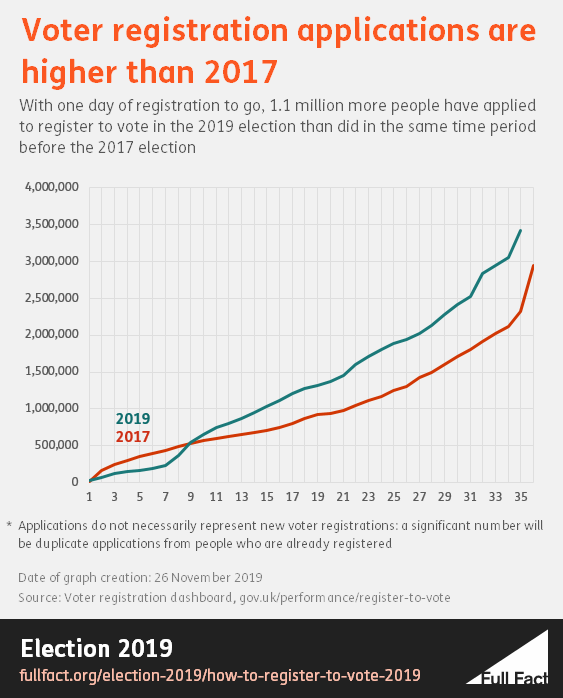How to register to vote: everything you need to know
Today—26 November 2019—is the last day you can register to vote for the general election on 12 December. Here are a few facts about the process of registering and voting.
Firstly; if you have already voted while living at your current address, you do not need to re-register.
You have until 11.59 pm to register if you want to vote in person. If you want to register to vote you can do this online, or in person at your local electoral office.
If you want to vote by post, you have until 5pm on the 26th to register in England, Scotland and Wales. You will then be sent a postal vote which you must return by the end of polling day (either in person at the polling station or Electoral Registration Office or by post in advance).
Join 72,953 people who trust us to check the facts
Sign up to get weekly updates on politics, immigration, health and more.
Subscribe to weekly email newsletters from Full Fact for updates on politics, immigration, health and more. Our fact checks are free to read but not to produce, so you will also get occasional emails about fundraising and other ways you can help. You can unsubscribe at any time. For more information about how we use your data see our Privacy Policy.
If you want to vote by proxy on the day, and you live in England, Wales or Scotland, you can do that after you register to vote, but before 4 December. Your proxy must be someone registered to vote, and they can only be proxy for two people (though possibly more than this if the extra people are close family).
It is now too late to register to vote by proxy or by post if you live in Northern Ireland.
You can register to vote if you’re over the age of 16 (or 14 in Scotland) but won’t be able to vote in this general election.
You can vote if you’re aged 18 or over on polling day (the day you vote—the 12 December), if you are a British, Irish, or qualifying Commonwealth citizen. EU citizens in the UK can’t vote in general elections, but they can in some other elections.
When voting on 12 December, you are voting to elect an MP to represent your local area. You can find information about your local candidates and when hustings are here. If you want more information on the parties in general, you can also read our ongoing series of fact checks of the party manifestos and all our other fact checks of statements made by parties and candidates in the general election.
We’ve seen some claims regarding registering to vote circulating; here are our conclusions:
It is TRUE that students can register to vote in two places, but they can only actually vote in one location during a general election and can decide where on the day.
It is also TRUE that if you don’t have a fixed address to register to vote you can pick an address you have previously been associated with or one that relates to your current situation.
However, it is NOT TRUE that four million 17 year-olds will turn 18 and be eligible to vote in the December election; the number is much lower.
Applications for voter registration are currently significantly higher than they were in the same time period before the 2017 general election. However, this doesn’t mean there will be this number of new voters: based on previous votes, a significant number will be duplicate applications from people who were in fact already registered to vote.
